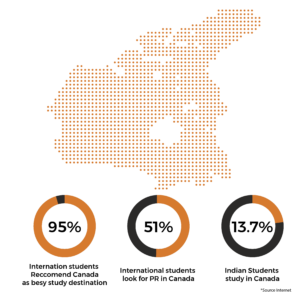
Spreading over 99 lakh square kilometers, the second largest country on the globe, Canada, is warm and welcoming land. Multiculturalism is what the population of 36 million proudly flaunts. It’s foreign only until you land here! Study in Canada and witness something you won’t anywhere else !
Economy
With a vastly varied economy, Canada is a world leader in Aerospace, Pharmaceuticals, Telecommunication and Biotechnology. The demographic diversification of industries is prominent. While Eastern Canada is known for agriculture, forestry and fisheries, the northern counterpart grabs its spot for gas and oil exploration. The provinces of Ontario and Quebec are well known for industries.
Why Study in CANADA
- Globally acknowledged qualifications
- Reasonable education outlays
- Furthermore, is has a multicultural Society.
- Moreover, there Availability of remunerative internships
- Post Study Work Visa
- Decent job opportunities for graduates
- Additionally , there is always possibility of Permanent Residency.
- Healthy and Safe Communities.

Getting residency becomes a task once you complete your studies abroad. But Canada’s got your back here as well, with its distinctive program for immigrant students.
PNP – Provincial Nominee Program – Most Provinces and Territories in Canada have an agreement with the Govt. of Canada that allows them to nominate immigrants who wish to settle in that province. Provincial Nomination is an important fast-track option for Canadian Permanent Residency. A student can apply for PR after completion of the course under provincial nominee program if the province is participating at that point of time.
Provinces including Ontario, Alberta, British Columbia, Manitoba, New Brunswick, Newfoundland and Labrador, Northwest Territories, Nova Scotia, Prince Edward Island, Saskatchewan and Yukon are the periodic participants of this program. It helps skilled and/or experienced professionals to obtain permanent residency with comparative ease and increased pace.
Special provisions for parents are also available:
- Parents can be sponsored to permanently reside in Canada.
- Super Visa– This special visa was brought to existence for visiting parents and grandparents of permanent residents or citizens of Canada. It is valid for upto ten years and allows parents or grandparents to remain in Canada for upto 24 months at a time without the need for renewal of their status.
4 Canadian universities have their spot in the top 100 world rankings:
- McGill University
- University of Toronto
- University of British Columbia
- Alberta University
Moreover, 9 more Universities make it to top 300, in the world rankings. These are:
- McMaster University
- University of Waterloo
- Calgary University
- University of Western Ontario
- Queens University
- Simon Fraser University
- Dalhousie University
- University of Ottawa
When to apply?
September and January are the major intake periods.
There’s also another limited intake during may.
Eligibility Criteria
The eligibility criteria for Indian students for admission to various masters and PG diploma courses is as follows:
Masters – Percentage: While the minimum required percentage in Bachelors is 65%, most high ranked universities would ask for at least 70%.
Educational requirements:
- For technical streams (engineering,pharmacy, computer science etc.) – 16 years full time education
- ANd for MBA – 15 years full time education accepted in some universities.
PG Diploma –
- Minimum 50-55% in Bachelors.
- 15 years of education accepted for all PG Diplomas in community colleges.
- For some programs, there might also be specific requirement of a particular subject.
Work Permit for Students studying in Canada
Students who study in Canada are eligible to work on or off campus from day one.
For this, students are provided with a study permit which allows them to work on/off-campus for up to 20 hours per week during the academic session and full-time (i.e. 40 hours per week) during scheduled breaks without the need to apply for a separate work permit. As a matter of fact ,the only criterion to hold a study permit is that one should be pursuing an academic, vocational or professional training of six months or more that would lead to a degree, diploma or certificate at a Designated Learning Institution.
Moreover, many of the programs are bundled with inbuilt internships of one or two semesters. These aid in providing the required experience and industry exposure to the students.
Post Study Work Visa after study in Canada
All international students who have studied in Canada and have graduated from a Canadian post-secondary institution are eligible for this Visa. In order to attain their eligibility they:
- Should have studied full-time for at least eight months preceding the completion of their program and have graduated from a Designated Learning Institution.
- Necessarily , you must have received a written notification of eligibility to obtain the degree, diploma, or certificate in their study program after having completed and passed it successfully.
- Student must apply for a post study work permit within 90 days of receiving written confirmation from their academic institution that they have met the requirements of their program.
- Must have a valid study permit when applying for the post study work permit.
- Moreover,The Post Study Work Visa provides no restrictions on the type of employment and no requirement for a job offer.
Eligibility Criteria For IELTS Under SPP
For Diplomas or Certificates (after 12th) – requirement of IELTS for visa is 6.0 with no band less than 5.5.
For Bachelor’s Degree, Post Graduate Diploma or Certificates – requirement of IELTS for visa is 6.0 with no band less than 5.5.
However if the institution requires a higher score (like 6.5 with no bands less than 6.0 or higher) then the student needs to comply with it irrespective of the lower basic visa requirement under SPP.